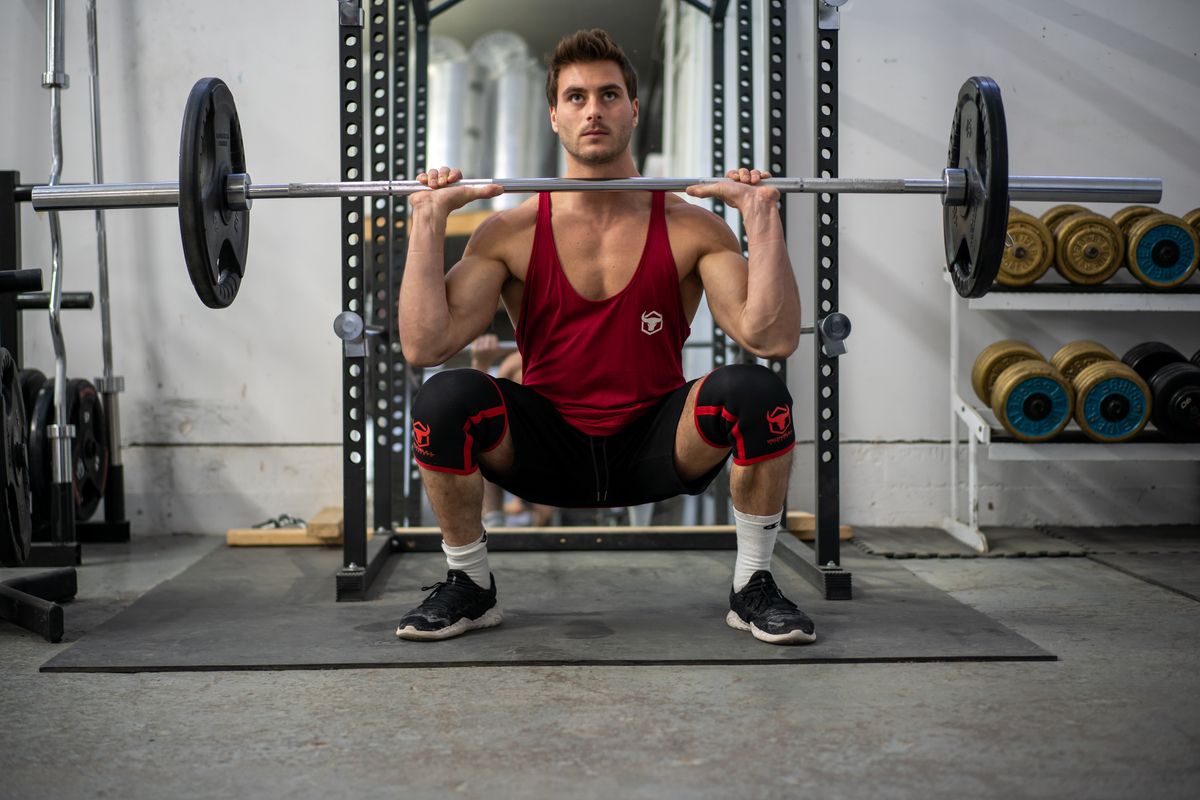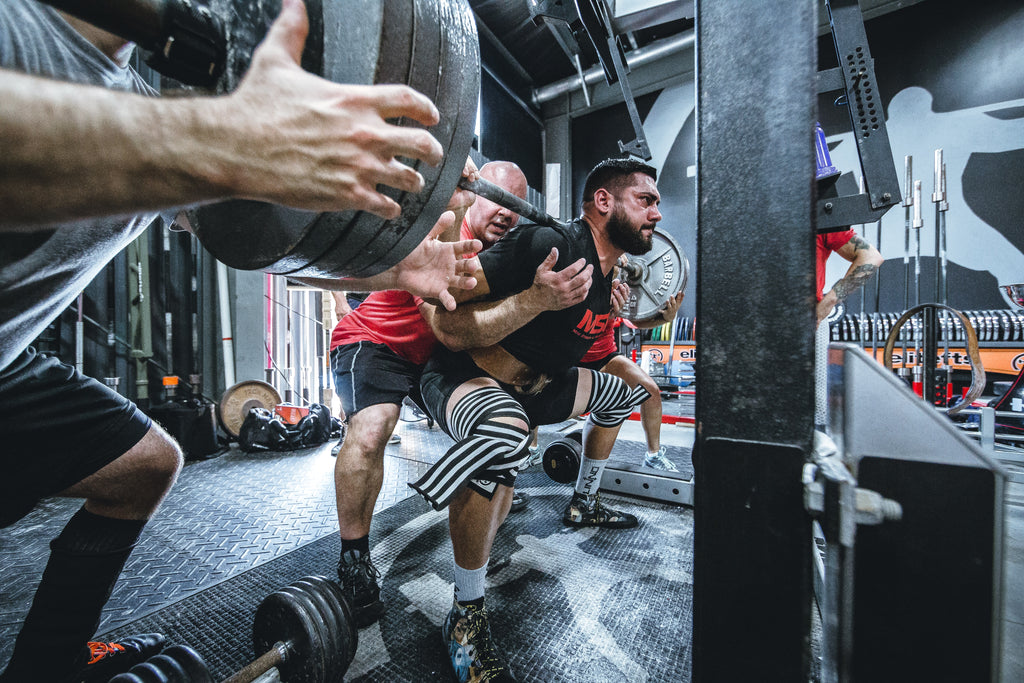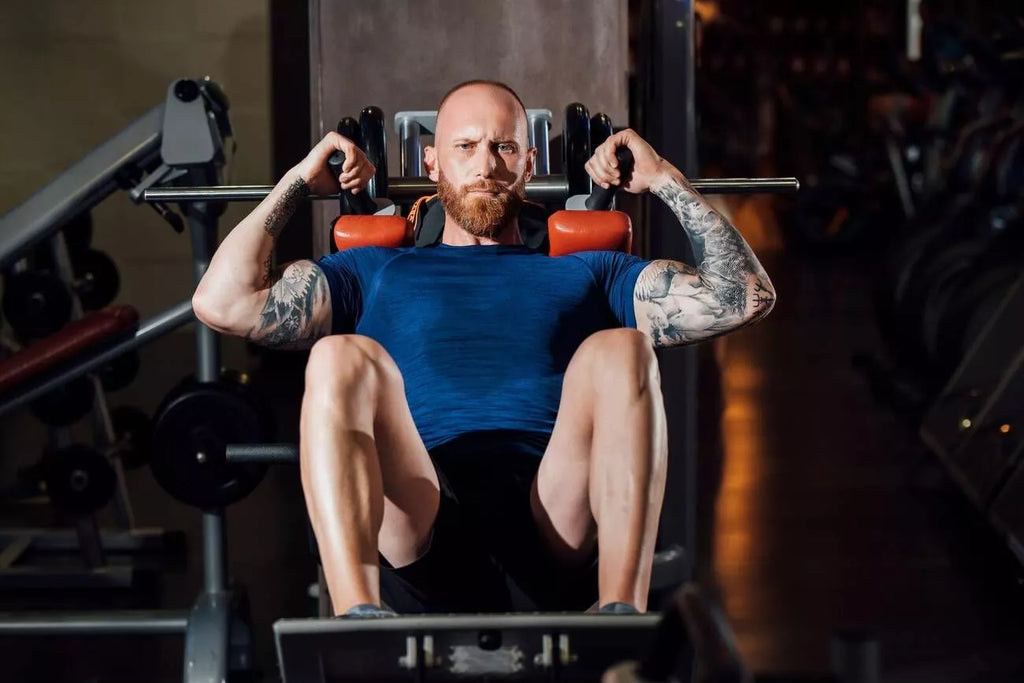Knee Noises: Knee Popping When Squatting | Good or Bad?

There you are, banging out squat after squat, turning yourself into a more physically robust human being with every repetition you complete. It's a good feeling…except you're not sure if the constant knee cracking and popping you're noticing is something you should be concerned about. Is it bad if your knee makes noise when squatting? Or is it merely the product of how knees work?
In this article, I'll explain everything you need to know about noisy knees, including why it happens, what it means, and what to watch out for when squatting (or when performing any other lower-body exercise such as lunges, split squats, etc.). After reading all the way through, you'll have the answers you're looking for and the confidence you'll need to know why your knees pop when squatting.
Alright, let's learn all about the nature of knee noises that arise when performing the squat.
Why your knees click and pop when squatting
Knees can make various types of sounds when bending and straightening — a requisite movement when squatting, lunging, pushing sleds, etc. As we begin to tackle the topic of why your knees make noise whenever you squat, it's essential to know a few critical terms regarding the nature of knee sounds and sensations.
In the world of human physiology (the study of the functioning of the human body), numerous terms are used to describe the sounds that joints (such as the knee) can make, and each one can generally be associated with different events taking place in or around a joint when noise is made.
The four types of knee sounds worth understanding are:
- Crepitus
- Clicking
- Popping
- Snapping
Understanding what each of these noises or sounds represents is necessary since it will better help you understand what's likely taking place when any of these sounds or sensations occur.
Keep in mind that these terms can be pretty subjective; most patients I evaluate and treat often use these terms interchangeably.
Nonetheless, I implore reading through the following sections to ensure you understand these individual noises and sensations accurately.
Knee crepitus sensations
The most common term you'll want to be familiar with iscrepitus,which describes a grating sound or sensation that arises within the joint when moved. I often term this as experiencing "Rice Krispies" within the joint due to the oddly similar sound or sensation it creates.
Clinically, I find knee crepitus to be the sound and sensation that causes the greatest concern with the lifters I evaluate and treat. Thankfully, it's nothing to be concerned about so long as it's not painful. This is true for athletes and non-athletes alike.
The sensation of crepitus occurring within the knee (i.e., feeling the "Rice Krispies" sensation) is most often due to fluid flowing behind the kneecap (known as the retropatellar surface). This surface behind the knee is somewhat rough in nature, creating a turbulent fluid flow when moving your knee, resulting in the grating-type sensations that are felt when the knee bends.
Knee clicking & snapping sounds
Knee clicking and snapping are different from experiencing crepitus as they refer to a single sound rather than the numerous little "Rice Krispie" noises that occur with the latter.
A click tends to be more audible than palpable (i.e., you don't feel the click or snap as much as you hear it), whereas a snap tends to be the opposite (you often feel it more than you hear it). This isn't always the case, mind you, but it is a general rule.
While clicking and snapping in the knee can arise for a variety of reasons, in healthy knees (knees that do not have a history of traumatic injury or osteoarthritis), the sound is most likely the result of any tendons crossing your knee joint suddenly moving from one position into another.
When tendons move around, they rub and move over numerous lumpy and bumpy bony surfaces. When this happens at a quick enough rate, it can produce a small clicking sound or snapping sensation.
Knee popping sounds
Popping sounds tend to get the most attention of all the sounds or sensations that the knee joint can produce. I often find my patients get concerned when hearing this sound since they associate the loudness with a major problem (they tend to think the louder the sound is, the more serious of an issue there must be).
Thankfully, there's nothing to be alarmed about when it comes to popping sounds within the knee, provided your knees are otherwise healthy and the popping sound isn't painful.
The popping sound in a healthy joint is ultimately the result of movement between the joint's surfaces (i.e., between the ends of two bones). When two joint surfaces move against one another, these surfaces can slightly separate or displace from one another, which creates a vacuum effect within the now open space.
When this occurs, there is an inwards collapse of gas bubbles that rush into this vacuum, creating the popping sensation we've all heard and felt within our joints.1
What about painful cracking and popping?
An important distinction to make is the presence of pain or discomfort with clicking, popping, or snapping sensations in the knee. Naturally, knees can be painful and make noise at the same time...but these soundsdo not guaranteethat pain is the result of any knee sounds being produced (though it's possible it might be).
As a brief example: In one study examining the relationship between the presence of patellofemoral pain syndrome (PFPS) and knee noises in women, the authors found that pain levels in knees demonstrating the presence of crepitus with PFPS were no different than pain levels in those with PFPS who did not have crepitus during physical activities.2 In other words: knee pain and knee noises aren't necessarily related to one another.
The take-home message:Knees will click, crack, and pop when squatting in lifters of all ages and genders. It's nothing to be concerned about, provided that it's non-painful. For lifters who do not have a history of knee injuries (ACL reconstruction, meniscal tears, etc.), you can likely consider the noises you're hearing to be quite normal and "business as usual" for the tissues within your knees.
Can you fix knee popping when squatting?
If you're experiencing popping, clicking, or snapping when you're performing squats — or any other leg exercise — there's likely nothing that needs to be fixed, provided the clicking is not painful, and you don't have any previous significant trauma within your knees.
If your knee is clicking, snapping, or popping in a way that causes pain or discomfort, your best bet is to get an orthopedic examination from a qualified healthcare professional since pain can arise for numerous reasons and signify numerous potential issues.
If you feel that you're getting a pain-free snapping or clicking around your knee when squatting, and you find that this sensation bothers you (in a non-painful manner), it may be worth checking the mobility of your quadriceps and hamstrings.
These muscles all have respective tendons that cross over the knee joint, all of which lengthen, contract, and move around the knee when squatting. Any abnormal or excessive tension in these muscles will likely place excessive tension on their respective tendon. A tendon with abnormal tension will have a harder time moving around the knee when squatting, leading to louder snaps or clicks as its otherwise rigid fibers rapidly slide over any anatomical lumps or bumps on the thigh bone (Femur) or the shin bone (tibia) or the fibula (small bone beside the tibia).
Easy and effective strategies for getting your muscle tension and subsequent knee sounds under control before you squat include:
- Performing a dedicated warm-up routine that increases blood flow into your muscles (this heats up the muscles and can reduce stiffness).
- Performing soft-tissue manipulation, such as foam rolling, before your squat workout.
- Getting professional treatment such as massage therapy, physical therapy, or similar interventions to help restore mobility to your legs and knees.
Using knee sleeves for squats (do they help with knee popping?)
I often have lifters ask me if wearing knee sleeves for squats can help reduce any sounds they're experiencing within their knees when they squat (they often ask this question since they think these noises are bad or harmful).
You can certainly opt to wear knee sleeves when squatting (I personally enjoy how they keep my knees warm). However, it's important to realize that knee sleeves likely won't do anything to "correct" or "treat" any mechanisms that are causing your knees to snap, click, or pop when squatting.
The one solid benefit, however, is the potential for knee sleeves to reduce your ability to hear the sounds or noises when squatting since the neoprene material will dampen or muffle sound transmission from beneath the sleeve.
So, whether you opt to wear 5mm or 7mm knee sleeves (either is perfectly fine), be aware that you shouldn't wear them with the belief they're necessary if your knees make noises when squatting, nor should you wear them with the expectation that they will eliminate any of these sounds.
Final remarks
Regardless of your age or gender, so long as you have otherwise healthy knees (no pre-existing injuries, nasty osteoarthritis, etc.), the current scientific consensus within the medical community is that knee popping when squatting is nothing to worry about, so long as it’s not painful. So, now that you know what causes your knees to pop, snap, and click when squatting, let your mind rest easy while making your legs work hard!
References:
- Protopapas MG, Cymet TC. Joint cracking and popping: understanding noises that accompany articular release.J Osteopath Med. 2002;102(5):283-287.
- 2. de Oliveira Silva D, Pazzinatto MF, Del Priore LB, et al. Knee crepitus is prevalent in women with patellofemoral pain, but is not related with function, physical activity and pain.Phys Ther Sport. 2018;33:7-11.










